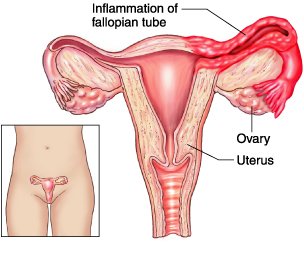salpingitis is one of the most common causes of female infertility. It is inflammation of the fallopian tubes which is triggered by bacterial infection. If left untreated, the fallopian tube maybe permanently damaged so that the eggs released each menstrual cycle can't meet up with sperm. Sometimes, it's called pelvic inflammatory disease (PID).
Salpingitis can be classified into two types: acute and chronic. In acute salpingitis, the fallopian tubes will become red and swollen. Sometimes the fallopian tubes may stick to nearby structures such as the intestines. While chronic salpingitis is milder, longer lasting and may not produce noticeable symptoms in patients.

Salpingitis Causes
In most cases, salpingitis is caused by a bacterial infection. The common types of bacteria resulting in this condition include mycoplasma, Staphylococcus, and Streptococcus. However, it can also result from some sexually transmitted diseases such as chlamydia and gonorrhea.
Salpingitis Symptoms
Symptoms may not be present in mild cases of salpingitis. If present, they may include:
Abnormal smell in vaginal discharge
Abnormal color in vaginal discharge
Painful periods
Spotting between periods
Pain during ovulation
Uncomfortable or painful sexual intercourse
Abdominal pain on both sides
Fever
Frequent urination
Lower back pain
Nausea and vomiting
Usually appear after the menstrual period
Salpingitis Diagnosis
A number of tests can be involved to diagnose salpingitis, including pelvic examination, blood tests, mucus swab, and laparoscopy.
a. Pelvic examination can be used to check for tenderness and discharge.
b. Blood tests can be used to to check the white blood cell count and other factors that indicate infection.
c. Mucus swab is a procedure that a smear is taken to be cultured and examined in a laboratory so that the type of bacteria can be identified.
d. Laparoscopy: In some cases, the fallopian tubes may need to be viewed by a slender instrument inserted through abdominal incisions.
Salpingitis Treatment
Treatment for salpingitis can be various, depending on the severity of the condition.
a. Antibiotics: Antibiotics are the most common treatment for salpingitis. It can effectively kill the bacteria that result in the disease.
b. Herbal Medicines: Herbal medicines are another alternative treatment for salpingitis and the most famous one is Fuyan Pill. Unlike antibiotics, it will not cause any side effects and drug resistance.
c. Surgery: Surgery is usually the last choice for salpingitis patients when the condition resists drug treatment.

